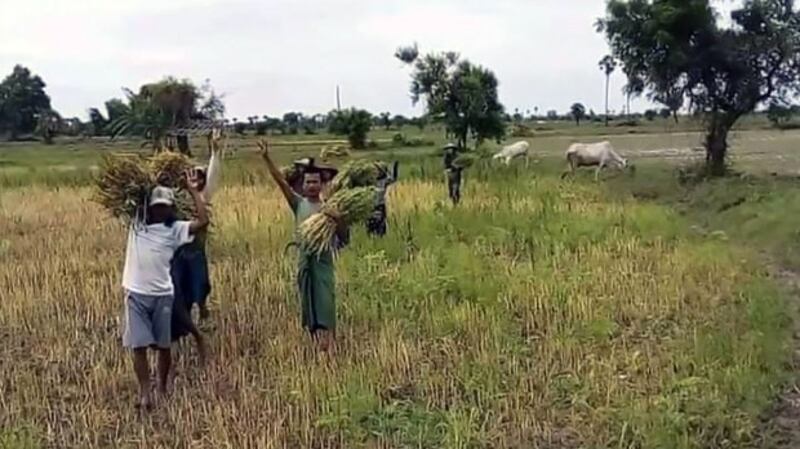Farmers in Myanmar’s Magway and Sagaing regions have emerged as the fiercest fighters to military rule, after years of drought, a global pandemic, and the devastation wrought by pro-junta forces have left them, they say, with little left to lose.
Farmers account for around 70 percent of Myanmar’s population of 54 million people and are most heavily concentrated in Magway and Sagaing, which has seen some of the heaviest fighting between the military and prodemocracy People’s Defense Force (PDF) paramilitaries since the junta seized power in a Feb. 1, 2021, coup. Amid the clashes, civilians in the two regions have suffered the highest death tolls and reported the most catastrophic destruction of property in the country.
Speaking to RFA’s Myanmar Service on condition of anonymity, a resident of Sagaing’s Pale township said that prior to the coup, poor weather conditions and the pandemic had already caused a collapse in the crop market, causing farmers throughout the region to lose all their investments.
But since February last year, the military launched offensives in the country’s remote border regions and now regularly raids villages it accuses of providing a haven to the PDF, looting and torching homes, and arresting their inhabitants, the Pale resident said. In addition to reports of arson and arrests, RFA has documented reports of soldiers torturing, raping and killing villagers.
“In our village, the army has set many houses on fire. As a result, we don’t have any plows or farm implements to work in the fields,” the resident said. “Some people have been persecuted by the army and others killed. Meanwhile there is no land to work on.”
Nway Oo, a 20-year-old woman from Sagaing’s Myaung township, told RFA that residents of the region are desperate because the military is destroying their homes and farmland and regularly conducts air strikes on villages.
“Usually this is the time for us to work in the fields as farmers, but we can no longer do so. All our goals and aspirations have been lost,” she said. “If I have only a minute left to live, I’ll use that sole minute to fight against the military dictators.”
Many farmers in Sagaing say they have taken up arms to fight the military because they have no other option.
Boh Naga, the leader of an armed insurgency group in the Pale township area, told RFA that people in the region are increasingly willing to sell their land and homes to buy food and weapons for the resistance.
“The majority of farmers in the Central Plains are looked upon as uneducated, ignorant and having low living standards, but the children of these farmers and peasants are involved in the liberation of this country,” he said.
“Everyone knows how wicked and brutal the junta is, and everyone knows they need to fight. And yet, while the rich send donations and applaud from the sidelines, these farmers are sacrificing their lives and whatever they own to fight the military. I don’t know if this is a sad thing or something to be proud of.”
Prior to the coup, Boh Naga was self-employed in the agriculture sector. He told RFA that he felt it was his duty to take up arms because of the country’s political situation, but said he hopes to return to his earlier work when the junta has been removed from power.

‘The situation is getting worse’
In the 13 months since the coup, junta security forces have arrested nearly 9,500 people and killed 1,597, according to the Bangkok-based Assistance Association for Political Prisoners — mostly during peaceful anti-junta protests. The junta has justified its seizure of power by saying that the deposed National League for Democracy (NLD) used voter fraud to sweep the country’s November 2020 election but has yet to provide evidence of its claims.
Political analyst Than Soe Naing told RFA that the lives of farmers in Myanmar have never been so difficult.
“Throughout history, our farmers have never been as insecure as they are today. Some of them have been brutally killed, while others have had their houses burned. They are not even allowed to farm their own land,” he said.
“But the situation is getting worse, with more airstrikes and killings and arson. Since they don’t have the ability to work in the fields, I expect that half the population in the country will be facing a food shortage or starvation in the coming year.”
Farmers in Myanmar are no stranger to popular revolt. On Dec. 22, 1930, a physician named Saya San led a group of landless and destitute farmers against British rule in one of Southeast Asia’s most defining anti-colonial movements.
Two years after orchestrating a military coup and establishing Myanmar as a one-party socialist state in 1962, General Ne Win designated March 2 as Farmer’s Day to acknowledge their contributions to the development of the nation.
Residents of Sagaing region told RFA that decades later, the spirit of Myanmar’s farmers remains just as strong and said their sense of duty in protecting the nation is unchanged.
Reported by RFA’s Myanmar Service. Translated by Khin Maung Nyane. Written in English by Joshua Lipes.
